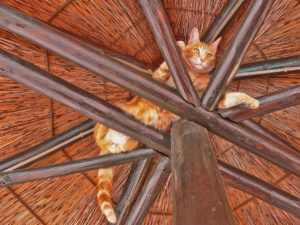Curiosity
may have killed the cat; more likely
the cat was just unlucky, or else curious
to see what death was like, having no cause
to go on licking paws, or fathering
litter on litter of kittens, predictably.
Nevertheless, to be curious
is dangerous enough. To distrust
what is always said, what seems,
to ask odd questions, interfere in dreams,
leave home, smell rats, have hunches,
does not endear cats to those doggy circles
where well-smelt baskets, suitable wives, good lunches
are the order of things, and where prevails
much wagging of incurious heads and tails.
Face it. Curiosity
will not cause us to die –
only lack of it will.
Never to want to see
the other side of the hill
or that improbable country
where living is an idyll
(although a probable hell)
would kill us all.
Only the curious
have, if they live, a tale
worth telling at all.
Dogs say cats love too much, are irresponsible,
are changeable, marry too many wives,
desert their children, chill all dinner tables
with tales of their nine lives.
Well, they are lucky. Let them be
nine-lived and contradictory,
curious enough to change, prepared to pay
the cat price, which is to die
and die again and again,
each time with no less pain.
A cat minority of one
is all that can be counted on
to tell the truth. And what cats have to tell
on each return from hell
is this: that dying is what the living do,
that dying is what the loving do,
and that dead dogs are those who never know
that dying is what, to live, each has to do.
from Inside Out: Selected Poetry and Translations (Polygon, 2008), © Alastair Reid 1978, 2008. Used with permission of Polygon Publishing.







